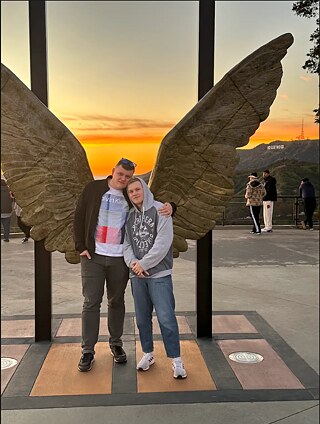In the past few months, tens of thousands of Russians have fled Putin's regime for the USA, many of them queer—like Dmitrii and Max, who are determined to find happiness in the country of their former adversary. Dmitrii remembers the day vividly—the harsh light, the stares from the border officers, and most of all, the fear. On February 1, 2023, at noon, he and Max finally stood in line at San Ysidro. The border crossing in the dusty desert between Mexico and California is one of the busiest in the world. It's also the most well-known entry point for migrants fleeing war, poverty, and persecution in their home countries, hoping to start a new life in the United States. Here, the two young men waited for the moment for which they had risked so much and left everything behind.
These are the kinds of scenes you associate with the southern U.S. border—the images and stories of migrants, refugees, and asylum seekers pouring into California from Mexico. Most come from Central and South American countries: Venezuela, Mexico, Honduras, El Salvador, Guatemala, Cuba, and Haiti—seeking their sueño americano, their American dream. But since 2022, something has shifted at the border. Among the immigrants are more and more Russians, fleeing Putin via Mexico to the USA. In recent years, their numbers have skyrocketed: from 13,000 the year before the invasion of Ukraine to 57,000 last year.They leave because they fear imprisonment for speaking out critically. They feel crushed by state propaganda and the nihilistic atmosphere in the country. They don't want to be sent to the front to fight in Putin’s war. Or they don’t feel safe due to their sexual orientation, especially with the country's increasingly stringent anti-LGBTQI laws—just like Max and Dmitrii, who have requested not to use their last names in this story.
The two are a couple. That’s what they told the U.S. border officers too. They drove their used white van from their small apartment in the San Fernando Valley, north of Los Angeles, to Eugene Maysky’s office to tell their story. Eugene works for the "Imperial Court of Los Angeles and Hollywood," an NGO that advocates for human rights and LGBTQI equality. After arriving, Max and Dmitrii first stayed in an emergency shelter. Now, they sit close together on a black leather sofa, not far from Downtown L.A.
The border between the USA and Mexico is 3,145 kilometers long
For months, they stayed in Georgia, debating whether they should really go to the U.S. One of their friends was detained in immigration custody in Louisiana. The decision to leave had already been made by then. That was in the weeks following the invasion of Ukraine on February 24, 2022. On TV, it sounded as if Putin was protecting people and saving lives, but Dmitrii knew what people like him were really experiencing. He read about kidnappings and violence against gay men, particularly in the Caucasus region. In Chechnya, for example, homosexuals have been persecuted, tortured, and killed by the state for years. Dmitrii knew the same could happen to him in Russia.
Max is 22 and comes from a small town near Kursk, not far from the Ukrainian border.
In Russia, Max had started studying psychology. In May 2022, the algorithm of a dating app connected him with Dmitrii while Max was serving in the military. In photos from that time, Max looks like a different person—short military haircut, striking a tough pose in uniform. But he was suffering from panic attacks. His unit was stationed near the border, and more and more of them were being sent to the front lines. “We were told we were defending our country, but no one really understood what we were fighting for,” he says. With some luck, Max found a doctor who diagnosed him with a neurological condition, and on May 31, he was discharged early from military service. A week later, when he traveled to Moscow to meet Dmitrii, he felt excited but also wary. In Russia, it’s not uncommon for gay men to be lured through dating apps to meeting places, only to be ambushed by violent gangs. Max liked how big and strong Dmitrii was, but it also briefly scared him. Then things moved quickly. After two days, Dmitrii gave him a ring “as a symbol of the beginning of our relationship.” It was clear they were now together.
I didn’t want my friends and family to think of me as a traitor.
Dmitrii
For most Russians looking to emigrate, Europe would be an obvious destination. However, it’s nearly impossible to reach because most can’t obtain a Schengen visa. Since Mexico, unlike many other countries, doesn’t require a visa for Russians to enter, the U.S. becomes their best option.
Like many other Russians fleeing, Max and Dmitrii decided in September 2022 to first drive across the border to Georgia and continue their journey from there. They waited over 38 hours in a long line of cars at the Georgian border. Shortly before, Vladimir Putin had announced the mobilization of the army. “It felt apocalyptic. So many people on the run. There was no food, no toilets,” Dmitrii recalls. Many people simply abandoned their cars and continued on foot. “Everyone just wanted to get away, no matter how.” Once they reached Georgia, they hesitated for a long time. A friend of Dmitrii’s had been detained in immigration custody in Louisiana after illegally entering the U.S. Each year, thousands end up in these detention centers, which are notorious for their harsh conditions. Max and Dmitrii suddenly weren’t sure if fleeing to the U.S. was a good idea. They went back and forth for three months. Then, in early January 2023, they finally boarded a plane. Like many Russians, they didn’t fly directly to Mexico City but went via Dubai so as not to arouse suspicion. After a night in Mexico City, they took a taxi to Toluca, a small airport mainly used by locals, to catch a flight to Tijuana.
Russians have a much better chance of obtaining asylum in the U.S. than migrants from Mexico or South America.
Max and Dmitrii were in the right place at the right time. Migration always involves a bit of luck. While they initially found themselves stranded in an emergency shelter in Tijuana, having run out of money, they managed to get an appointment within three weeks because the app wasn’t overwhelmed yet. Max says that when he saw the border fence and the American flag, he felt like he was in a Netflix show. It was surreal to be in this country. Almost everything he knows about the U.S. comes from American movies and TV shows.
On the evening of February 1, 2023, they arrived in Los Angeles. Now, they are waiting for their asylum application to be processed, a procedure that can often take up to four years and includes multiple hearings. In the meantime, asylum seekers are not allowed to work, so they rely on the support of aid organizations, charitable associations, and social housing projects. “I expected a lot less help from America than what we actually received,” Dmitrii says. “Russian propaganda claims that Americans only care about themselves and don’t like Russians.”

Max and Dmitrii in front of a sculpture of oversized wings, with the iconic Hollywood sign in the background. | © Photo: Pablo López Luz
Max and Dmitrii plan to get married soon, possibly even this year. Until then, Max is learning English and wants to continue his studies. He says that what he likes most about the U.S. is that he doesn’t have to worry so much about what other people think. He’s gotten his ears pierced and started wearing makeup. Dmitrii says the Max he met in Russia and the Max now are two different people. As for himself, he dreams of being able to work soon. In the meantime, he’s staying productive in other ways:
In online chat groups, Dmitrii helps other Russian-speaking LGBTQ refugees on the Mexican side of the border. Their numbers continue to grow.
